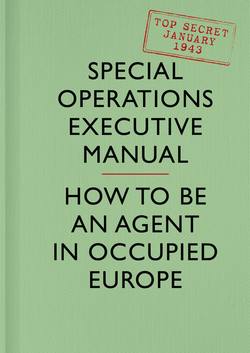Читать книгу SOE Manual: How to be an Agent in Occupied Europe - Special Executive Operations - Страница 13
5. “ALIBI”.
Оглавлениеa. Nature of “Alibi”.
In addition to your cover background, you must have an explanation ready for every subversive act, however small, e.g. conversation, journey. Such alibis are more important than your background cover. If they are good no further enquiries will be made.
You may be questioned about your activity in many different circumstances and have to conceal its true nature, e.g. when obtaining permits, telephoning by regular or snap controls, through infringing regulations or being called as a witness, through suspicious activity when under surveillance.
b. Construction of an “Alibi”.
Remember the following points:–
i. Plausibility. If you give a plausible explanation of your conduct no further investigation is likely. An unplausible one will be investigated and must, therefore, be watertight. A plausible story justifies a friendly policeman in letting you go. If your story is not plausible he may not dare to do so in case you are an agent provocateur.
ii. Detail. Decide on the “facts” which must be prepared in detail and those which can be left vague, e.g. people remember times of rendezvous trains, etc., but not when they have finished meals. If you can remember a time exactly there is usually a reason for it, e.g. because you checked your watch with the town hall clock or you turned on the wireless for a particular programme, and it is occasionally a good thing to mention this casually.
iii. Self-Consistency. Your “alibi” must be consistent with your circumstances, especially those immediately ascertainable, e.g. clothes, general appearance, special knowledge, activity.
iv. Cover Background. For choice your “alibi” should be consistent with your main cover background, but you may have to manufacture special background for the occasion.
v. Truth. The “alibi” should be as near the truth as possible, provided that it is not suspicious. Time can be expanded. Dates of events can be transposed. If you do this make sure you allow for different circumstances on different days, e.g. do not say you had been to the market if there is no market on the day for which you give your alibi, although there was one on the day the events of which you have transposed. Furthermore have a story ready in case you are asked about your movements for the day the events of which you have moved. Where the story is quite untrue the false parts can often be rehearsed. Cf. Build up of cover (above). It is dangerous to tell a story entirely untrue.
vi. Dead End. In so far as is possible the story should be closed. It should leave few openings for further investigation. Links with outside persons, events or places are dangerous.
vii. Consistency with Others. If you are going to mention people who will corroborate your story you must arrange this very carefully. Attention should be paid to the following points:–
1. Your stories should support each other without being exactly alike. In particular you should not all be vague on the same points, and precise on the same points.
2. Consider the possibility of arranging answers to unforeseen questions in a particular way, e.g. who took the initiative in a particular action. But if the period is fairly long divide it up so that A took the initiative during the first hour, B during the second etc. unless there is a particular reason for one person taking the lead e.g. because he was host, or because he knows the town better than the others.
viii. Discreditable Story. Consider the possibility of using as an “alibi” a discreditable story. Sometimes this can be used as an alternative upon which to fall back should the first story break down.
N.B. Provided that you have not been questioned about your alibi, you can change it freely; e.g. one to explain what you are going to do, a second to explain what you are doing and a third to account for what you have done.
c. False Confession.
Have ready, in case you are caught red-handed a story that you are engaged in subversive activity, but which protects your organisation, minimises your role and conceals the fact that you are a parachutist. If possible quote the names of friends who are dead or in safety, to support your story.
